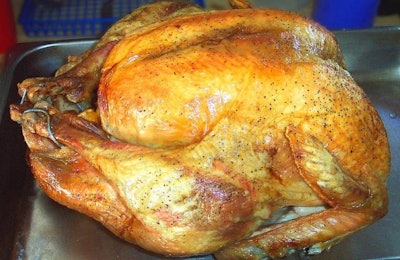
U.S. poultry companies will be allowed to ship raw and cooked turkey products to New Zealand under a new veterinary agreement between the countries.
New Zealand’s Ministry of Primary Industries (MPI) has accepted a new veterinary certificate for U.S. cooked turkey meat, giving the U.S. access to a market long considered to have great export potential.
The USDA’s Animal and Plant Health Inspection Service (APHIS) and the Food Safety and Inspection Service (FSIS) were notified of the approval by MPI on December 23. The decision came after two years of negotiations between MPI and USDA that followed New Zealand’s implementation in 2015 of new import health standards for turkey meat.
Although the push to open New Zealand to U.S. turkey intensified in recent years, it actually dates back as far as 2002 when the governments of both countries began working on the project. Over the years, and especially in the last few years, the U.S. effort has been led by the USA Poultry & Egg Export Council (USAPEEC) and USDA.
“This has been one of USAPEEC’s primary objectives for the turkey industry for the last couple of years,” said USAPEEC President Jim Sumner. “We have received tremendous cooperation from APHIS, USDA, and the National Turkey Federation (NTF). It has truly been a team effort.”
“This is an important step forward for the turkey industry in our efforts to enhance exports,” said NTF President Joel Brandenberger. “This is the result of a lot of hard work on the part of NTF and USAPEEC, and we also are grateful to the diligent efforts of the USDA and New Zealand teams that worked to negotiate this agreement. We look forward to exporting American turkey to this exciting new market.”
USAPEEC has received information that suggests all the remaining technical questions and issues in the matter have been resolved, said Dr. Shelly McKee, director of technical services for USAPEEC Atlanta. The next step is for the FSIS Export Library to be updated with the revised export requirements for New Zealand, which would provide U.S. exporters with the information they need to begin shipping.
USAPEEC, according to a press release from the organization, recognized the potential of New Zealand early on. The country lacked competitive local production, and officials there were receptive to opening the market. The process of gaining access lengthened, though, as research was conducted regarding health concerns raised by New Zealand officials. USAPEEC kept the project active over the years, continuing to provide information to move the process along.
McKee said New Zealand’s health standards had been trade-prohibitive, so the only product that could possibly be considered for export was cooked turkey. While McKee and APHIS worked to address opening the market by providing information to allay disease concerns, New Zealand re-wrote its health standards for the import of turkey meat.
USAPEEC consultant Nicole Dehnert who, with McKee, was instrumental in driving the effort, said the MPI team “showed dedication and made it a priority to assist (FSIS and APHIS) in opening the New Zealand market.” Gaining access to New Zealand, she added, “is a positive for U.S. turkey producers, and New Zealand consumers will welcome the opportunity to have access to a range of U.S. turkey products as a price-efficient form of protein in their diet.”
Also critical to the process of gaining the U.S. access was the support of the South Dakota Soybean Council, which has funded USAPEEC’s trade policy efforts in the market.
















